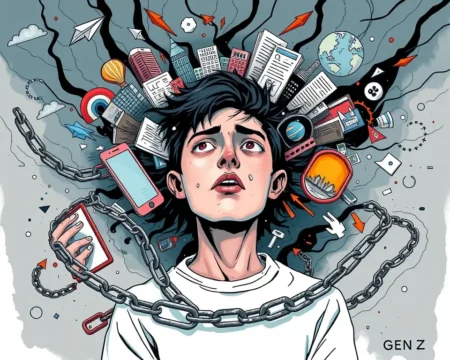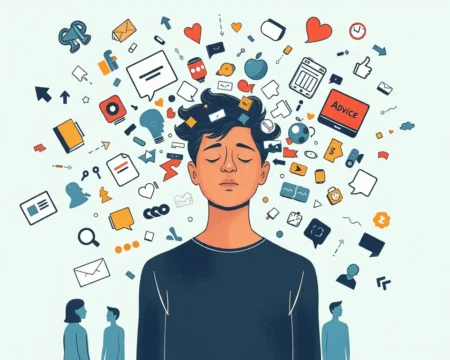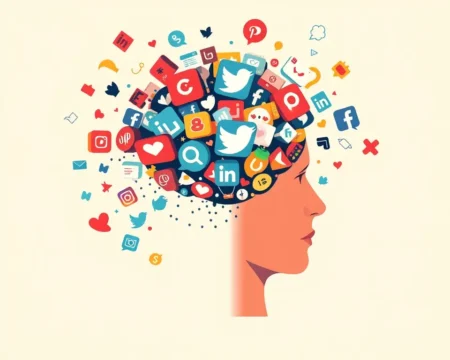TikTok, the reigning king of short-form video content, has evolved beyond dance crazes and viral challenges. It’s now a bustling hub for mental health discussions, with therapists, mental health advocates, and everyday users sharing tips, insights, and personal experiences. But is this “TikTok therapy” a force for good, or does it oversimplify complex issues and potentially do more harm than good? This article explores the pros and cons of social media psychology, helping you navigate this new frontier of mental health information.
The Rise of #TherapyTok
If you’ve spent any time scrolling through TikTok or Instagram lately, you’ve likely encountered “therapy talk”. These short videos offer quick tips on trauma healing, anxiety management, self-diagnosis lists, and mental health “red flags”. The numbers speak for themselves, with hashtags like #MentalHealthAwareness, #TherapyTok, and #SelfCare boasting millions of views.
Why is TikTok So Appealing for Mental Health Content?
- Accessibility: TikTok makes mental health information readily available to a wide audience, especially younger generations who may not seek traditional therapy.
- Destigmatization: Openly discussing mental health issues on TikTok helps reduce the stigma associated with seeking help. This normalization can encourage viewers to consider therapy or other mental health services.
- Community and Support: TikTok fosters a sense of community, connecting users with others experiencing similar issues. This sense of belonging can be therapeutic.
- Creative Communication: Videos often use relatable language and creative visuals to explain complex psychological concepts.
The Allure of TikTok Therapy: Shining a Light on the Benefits
TikTok therapy isn’t without its merits. It has the potential to be a powerful tool for raising awareness, providing support, and encouraging help-seeking behavior. Let’s take a closer look at the potential benefits:
Breaking Down Barriers and Increasing Access
One of the most significant advantages of TikTok therapy is its accessibility. For individuals who lack the financial resources to seek professional help, or who live in environments where mental health is stigmatized, TikTok can be a lifeline. It provides access to information and support that might otherwise be out of reach. With the vast majority of the U.S. population having mobile internet access, TikTok becomes a valuable tool for sharing mental health information and reducing barriers to care.
Normalizing Mental Health Conversations
TikTok has created a space where people can openly discuss their struggles with mental health. By sharing their experiences, creators help to normalize these conversations and reduce the shame associated with mental illness. This can be especially empowering for those who feel isolated or alone in their struggles.
A Stepping Stone to Professional Help
TikTok therapy can serve as an initial step for those hesitant to seek professional help. Watching creators share their therapy journeys, discuss medication, or offer practical tips can inspire viewers to explore these avenues themselves. The positive engagement with such content can foster a sense of community, reminding individuals that they are not alone.
Quick Access to Tools and Techniques
TikTok offers quick access to grounding exercises and other self-help tools. These videos can provide immediate relief for those struggling with anxiety, stress, or other mental health challenges. The short, digestible format makes it easy to learn and implement these techniques in everyday life.
Finding Your Voice and Validation
Creating content on TikTok can be a way for individuals to find, develop, and honor their own voice. Sharing personal experiences and insights can be empowering and can help to build confidence. Additionally, users can find validation for their own experiences through comments, responses, and by discovering content that resonates with them.
The Dark Side of the Screen: Unmasking the Dangers of TikTok Therapy
Despite its potential benefits, TikTok therapy also carries significant risks. Oversimplification, misinformation, and the potential for self-diagnosis are just a few of the concerns. It’s crucial to be aware of these dangers and to approach TikTok therapy with a critical eye.
Oversimplification and Misinformation
TikTok’s short video format often leads to the oversimplification of complex mental health issues. Conditions like PTSD, borderline personality disorder, or depression are frequently reduced to 15-second soundbites. This can give viewers an incomplete or inaccurate understanding of therapy and psychological disorders. A study of mental health videos on TikTok revealed that a significant percentage contained misleading information. Experts suggest that the misuse of “therapy speak” can lead to people feeling lonely and self-centered.
The Perils of Self-Diagnosis
One of the most alarming potential consequences of TikTok therapy is the rise in self-diagnosis. Many videos offer “tips” for diagnosing conditions like ADHD, leading young people to believe they have these conditions without seeking a formal diagnosis. This self-diagnosis can be harmful, as it may lead to misinterpretations of symptoms and a delay in seeking professional help when needed.
One-Size-Fits-All Advice
TikTok videos often offer one-size-fits-all advice, which may not be appropriate for everyone. Mental health is highly individual, and what works for one person may not work for another. It’s essential to remember that TikTok is not a substitute for personalized therapy from a qualified professional.
The Echo Chamber Effect
TikTok’s algorithm is designed to show you content you’ll like, which can reinforce your existing beliefs. This can lead to a confirmation bias, where you only seek out information that confirms what you already think, missing out on alternative perspectives. This echo chamber effect can be particularly dangerous when it comes to mental health, as it may prevent you from considering different diagnoses or treatment options.
The Downward Spiral: Addiction and Negative Triggers
For individuals already struggling with mental health challenges, TikTok can be addictive and triggering. The algorithm can lead users down a rabbit hole of negative content, exacerbating anxiety and other symptoms. The constant stream of information and stimulation can also lead to sensory overload and disturb sleep hygiene.
Credibility Concerns and Unvetted Sources
One of the biggest problems with social media therapy is the lack of clear guidelines about who is providing the information. Many creators on TikTok are not mental health professionals, and their advice may not be accurate or evidence-based. It’s crucial to check the credentials of any creator before taking their advice and to cross-check information with reliable sources.
Social Comparison and Cyberbullying
Like other social media platforms, TikTok can contribute to issues related to social comparison and perfectionism, negatively impacting self-esteem and potentially exacerbating eating disorders. The platform can also be a breeding ground for cyberbullying, trolls, and negative feedback, which can have a detrimental effect on mental health.
Navigating TikTok Therapy: A Guide to Safe and Informed Usage
So, how can you navigate the world of TikTok therapy safely and responsibly? Here are some tips to keep in mind:
Be a Critical Consumer
Always question the information you see on TikTok and be wary of oversimplified explanations or sensational claims. Look for creators who are qualified mental health professionals and who provide evidence-based information.
Verify Credentials
Before taking any advice from a TikTok creator, check their credentials. Are they licensed therapists, counselors, or doctors? If not, their information may not be accurate or reliable.
Cross-Check Information
Don’t rely solely on TikTok for mental health information. Cross-check information with other reliable sources, such as professional websites, books, and articles.
Be Aware of Your Triggers
If you find that certain content on TikTok is triggering or making you feel worse, don’t hesitate to unfollow those accounts or take a break from the app.
Limit Your Time Online
The research on social media’s negative effects on mental health is staggering. Set healthy boundaries for your social media usage and make time for other activities that promote your well-being.
Avoid Self-Diagnosis
TikTok can be a helpful tool for raising awareness about mental health conditions, but it’s not a substitute for a professional diagnosis. If you’re concerned about your mental health, reach out to a qualified therapist or psychiatrist.
Seek Professional Help
If you’re struggling with your mental health, don’t hesitate to seek professional help. A therapist can provide you with personalized support and guidance, and can help you develop coping mechanisms to manage your symptoms.
Platform Accountability
TikTok can collaborate with mental health organizations to verify creators who discuss mental health topics, ensuring their credentials and the accuracy of their content. Refining TikTok’s algorithm to prevent echo chambers of harmful content and promote diverse, balanced perspectives is essential. Young people need guidance on how to critically evaluate the content they consume and recognize the limitations of self-diagnosis and social media advice.
The Bottom Line: TikTok as a Supplement, Not a Substitute
TikTok therapy can be a valuable tool for raising awareness, reducing stigma, and providing access to mental health information. However, it’s essential to approach it with caution and to be aware of the potential risks. TikTok should be used as a supplement to professional mental health care, not as a substitute. By being a critical consumer, verifying credentials, and seeking professional help when needed, you can harness the benefits of TikTok therapy while minimizing the risks.










